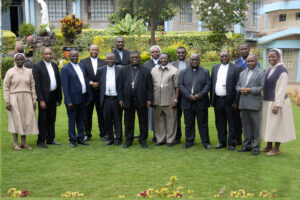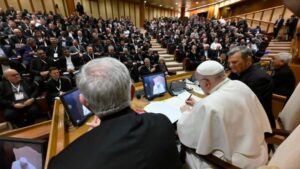AMECEA: Amidst Bewilderment on Vatican’s Document on Pastoral Blessings, AMECEA Region to Uphold African Heritage

Sr. Jecinter Antoinette Okoth, FSSA
National conferences in the Association of Member Episcopal Conferences in Eastern Africa (AMECEA) region, have declared their stand to respect African beliefs, moral values, and practices on issues of the same-sex union following the erroneous interpretations of the document released Monday, December 18, by the Vatican’s Dicastery for Doctrine of the Faith titled, “Fiducia Supplicans” (The supplicating trust) on the pastoral meaning of blessings.
According to some AMECEA countries who responded to the declaration that has raised confusion and anxiety among Christians and people who look up to the Catholic Church for moral, spiritual, and doctrinal guidance, “The Declaration is NOT about the blessing of same-sex unions and sacramental endorsement of the same as married couples. But whether or not the blessings of God through his Ministers can be extended to everybody regardless of their state.”
The Stand of the Kenya Conference of Catholic Bishops (KCCB)
Having analyzed the Vatican’s declaration on the interpretation of the sense of blessings in the Catholic Church, the bishops say, “In our African context, while recognizing the confusion existing in the more developed countries, of new unchristian models of “conjugal union” and “styles of life”, we are very clear on what a family and marriage is. The social situation of Same-sex marriages does not find acceptance in our culture.”
The Church leaders encourage understanding blessings as “a gesture of humble submission to God and His ways, while recognizing our sinfulness and need for conversion and of Salvation.”
Clarifying further the essence of receiving blessings from the servants of God, they said, “In blessing persons, we do not bless the immoral actions they may perform, but hope that the blessing and prayers offered over them as human persons will provoke them to conversion and to return to the ways of the Lord.”
“Therefore, the request for blessings is on a personal basis, and not in any way a blessing upon a style of life or sinful actions in their lives,” they added.
As the work of the Church is to gather the scattered, recover the lost, and redirect all sinners back to the fount of salvation and eternal life, the Bishops in Kenya clarify that no blessing can be understood outside the context of God’s Will and the Salvation and invitation to Communion with God. Hence it is advisable to understand that “Evangelization is a journey, and each makes this journey at his or her pace, aided by the grace of God, and the intercession and ministry of the Church.”
The Stand of the Episcopal Conference of Malawi (ECM)
On their part, members of the Episcopal Conference of Malawi (ECM) firmly resolve that the Catholic Church in Malawi will not permit blessings for same-sex unions of any kind or to those in an irregular union, to clear the misperception.
“To avoid creating confusion among the faithful, we direct that for pastoral reasons, blessings of any kind and for same-sex unions of any kind, are not permitted in Malawi,” they stressed in their statement dated Tuesday, December 19, a day after the release of the Faith declaration by Vatican’s Dicastery for Doctrine of the Faith.
Even though the Church leaders in Malawi who are holders of the Melchizedek priesthood, will not permit such kinds of blessings, they agree with the fact that ordinary blessings are conferred to people, objects of worship and devotion, sacred images, places of work, and fruits of the earth among others.
“Such blessings are to be given to anybody and anything bearing in mind that the great blessing of God is Jesus Christ, the Eternal Word with whom the Father blessed us while we were still sinners,” they expounded referencing Fiducia Supplicans.
The Stand of the Zambia Conference of Catholic Bishops (ZCCB)
The bishops in Zambia added their voice to the ongoing discourse and declared that the Vatican’s declaration “Is not for implementation in Zambia.”
“To avoid any pastoral confusion and ambiguity as well as not to break the law of our country which forbids same-sex unions and activities, and while listening to our cultural heritage which does not accept same-sex relationships, the Conference guides that the Declaration from the Dicastery for the Doctrine of the Faith of December 18th, 2023 concerning the blessing of same-sex couples be taken as for further reflection and not for implementation in Zambia,” reads in part the Prelates statement dated Wednesday, December 20.
Basing their arguments on the Sacred Scripture, the Conference reaffirms the traditional teaching of the Church that declares “homosexual acts to be intrinsically disordered and contrary to natural law.” Hence, “under no circumstances can they be approved.”
Clarification on the confusion from the Vatican’s declaration
After Monday’s publication of the declaration on the pastoral meaning of blessings, social media was a wash with varied analyses of the message from the Vatican. Bishops in their conferences within the AMECEA region tried to make sense of the document and cleared the air after the document raised several questions, confusions, and anxieties among the faithful and the people of goodwill wondering if the Catholic Church is endorsing and approving the “Same-Sex Marriages” or changing the understanding of “Marriage, as a Sacrament of the Church, between a man and a woman.”
In their explanation, the bishops in Kenya echo the message of Pope Francis that he constantly asks the people of God “to have open hearts as a Church, where all, irrespective of their moral status, can feel welcome.”
In this case, the bishops say, the document, Fiducia Supplicans,” expands the scope of “Church Blessings” to include “Simple blessings that are not given in a liturgical setting”. It states that “The value of this document, however, is that it offers a specific and innovative contribution to the pastoral meaning of blessings permitting a broadening and enrichment of the classical understanding of blessings.”
They explained further that the Document does not change in any way the understanding of Marriage as a Sacrament in the Church, an indissoluble union between a man and a woman, for life as it clearly states: “This Declaration remains firm on the traditional doctrine of the Church about marriage, not allowing any type of liturgical rite or blessing similar to a liturgical rite that can create confusion.”
The bishops in Malawi, clearly stated that the Declaration is not about the blessing of same-sex unions and sacramental endorsement of the same as married couples, but a document expounding on whether or not the blessings of God through his Ministers can be extended to everybody regardless of their state hence the title of the document is “On the Pastoral Meaning of Blessings” and not on the blessing of same-sex unions.
They clarified further, “The Declaration, while differentiating the meaning and levels of various blessings reiterates that the Church’s teaching on Marriage defined as “an exclusive, stable, and indissoluble union between a man and a woman, naturally open to the generation of children remains firm”.
“Therefore, the Declaration says, rites and prayers, that could create confusion between what constitutes marriage and what contradicts it are not allowed,” they said referencing Fiducia Supplicans.
Additionally, the Prelates in Zambia note that Fiducia Supplicans explore the theme of blessings, distinguishing between “ritual and Liturgical blessings”, on one hand, and “spontaneous” or “simple” blessings on the other.
“It is in this second category of blessings that the document considers the possibility of imparting a blessing even to those who do not live according to the norms of Christian moral doctrine but humbly request to be blessed,” the Wednesday message reads and continues to explain, “blessings are among the most widespread and evolving “sacramentals” or signs of popular devotion, which are distinct from “sacraments”.
In conclusion, the Conference invites all those involved in same-sex unions to “embark on the path of conversion with greater trust in God’s mercy and love; God whose “eyes are drawn to the person of a humbled and contrite spirit,” (Isaiah 66:2).


